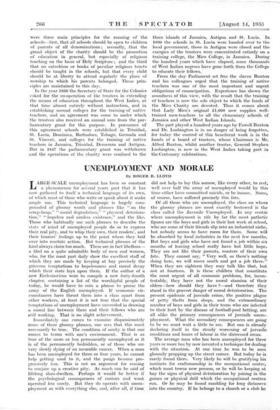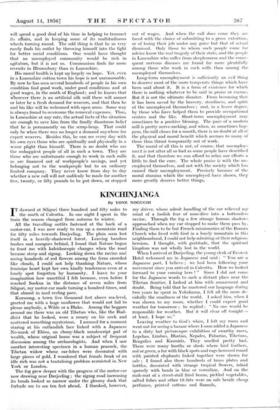UNEMPLOYMENT AND MORALE
By ROGER B. LLOYD
LARGE-SCALE unemployment has been so constant a phenomenon for several years past that it has now gathered to itself a technical language of its own, of which most of those who write or speak about it make ample use. This technical language is largely com- pounded of gloomy words and phrases like " on the scrap-heap," " moral degradation," " physical deteriora- tion," " hopeless and aimless existence," and the like. Those who habitually use such phrases to describe the state of mind of unemployed people do so to express their real pity, and to whip their own, their readers', and their hearers' feelings up to the point where they boil over into resolute action. But technical phrases of the kind always claim too much. These are in fact libellous— a libel on a quite admirable body of men and women, who, for the most part daily show the excellent stuff of which they are made by keeping at bay precisely the grievous temptations to hopelessness and moral decay which their state lays upon them. If the author of a new Ecclesiasticus were to compile a new forty-fourth chapter, containing a list of the worshipful people of today, he would have to coin a phrase to praise the army of the English unemployed. If economic cir- cumstances have thrust them into a class apart from other workers, at least it is not true that the special temptations of unemployment have succeeded in drawing a moral line between them and their fellows who are still working. That is no slight achievement.
Immediately one comes to examine dispassionately some of these gloomy phrases, one sees that this must necessarily be true. The condition of sanity is that one comes to terms with one's environment. That is as true of the more or less permanently unemployed as it is of the permanently bedridden, or of those who are very slowly dying of an incurable cancer. When a man has been unemployed for three or four years, he cannot help getting used to it, and the pangs become pro-. gressively less. This is not an argument for ceasing to conjure up a creative pity. As much can be said of lifelong slum-dwellers. Perhaps it would be better if the psychological consequences of custom and wont operated less surely. But they do operate with unem-. ployment as with everything else, and, after all, if time did not help to lay this sorrow, like every other, to rest, well over half the army of unemployed would by this time either have committed suicide, or be insane. Some, of course, have suffered precisely this fate.
Of all those who are unemployed, the class on whom the gloomy phrases are most exactly bestowed is the class called the Juvenile Unemployed. In any centre where unemployment is rife by far the most pathetic figures are the boys and girls in their last week at school, who see some of their friends slip into an industrial niche, but nobody seems to have room for them. Some will be absorbed by local industries in the next few months. But boys and girls who have not found a job within six months of leaving school really have but little hope. They are not like their parents, masters of their own fate. They cannot say, " Very well, as there's nothing doing here, we will move south and get a job there." When they are eighteen they may talk like that, but not at fourteen. It is these children that constitute the most urgent of all economic problems, for, incon- testably, they have not the moral stamina of their elders—how should they have ?—and therefore they stand in the gravest danger of moral deterioration. The present epidemic of juvenile crime, the positive plague of petty thefts from shops, and the extraordinary number of boys and girls in their teens who are infected to their hurt by the disease of football-pool betting, are all alike the primary consequences of juvenile unem-. ployment. What the secondary consequences are going to be we must wait a little to see. But one is already. declaring itself in the steady worsening of juvenile, conditions and hours of labour in the .distressed areas.
The average man who has been unemployed for three years or more has by now invented a technique for dealing. with the situation. At one time he was to be seen gloomily propping up the street corner. But today he is rarely found there. Very likely he will be gratifying his, instincts for craftsmanship in the occupational centre,- which most towns now possess, or he will be keeping at bay the signs of physical deterioration by joining in the games or physical drill which the occupational centres run. Or he may be found .rambling for long distances. into the country. If he belongs to a church or a club he will spend a good deal of his time in helping to transact its affairs, and .in keeping some of its multitudinous wheels turning round. The odd thing is that he so very rarely finds his outlet by throwing himself into the fight for better social conditions. One would have thought that an unemployed community would be rich in agitators, but it is not so. Communism finds far more recruits in Bloomsbuiy than in Lancashire.
His moral health is kept up largely on hope. Yet, even in a Lancashire cotton town his hope is not unreasonable. By now he has seen several hundreds of people in his own condition find good work, under good conditions and at good wages, in the-south of England ; and he knows that 'Wherever there is an artificial silk mill there will sooner or later be a fresh demand for weavers, and that then he and his like will be welcomed with open arms. Some way is always found to overcome the removal expenses. Thus, in Lancashire at any rate, the actual facts of the situation are enough to save him from the finally disastrous belief that he is permanently on the scrap-heap. That could only be when there was no longer a demand anywhere for expert weavers. Besides this, he can see every day with his own eyes those who are spiritually and physically in a worse plight than himself. There is no doubt who are the unhappiest people of all in such a town. They are those who are unfortunate enough to work in such mills as are financed out of workpeople's savings, and yet belonging not to the workpeople but to an ordinary limited company. They never know from day to day whether a new call will not suddenly be made for another five, twenty, or fifty pounds to be put down, or stopped out of wages. And when the call does conic they arc faced with the choice of submitting to a gross extortion, or of losing their job under any guise but that of actual dismissal. Only those to whom such people come for advice know the real tragedy of their state, and the people in Lancashire who suffer from sleeplessness and the conse- quent nervous diseases are found far more plentifully among those who work in such mills than among the unemployed themselves.
Long-term unemployment is sufficiently an evil thing to deserve most of the more temperate things which have been said about it. It is a form of existence for which there is nothing whatever to be said in praise or excuse. But it is not the ultimate disaster. From becoming that it has been saved by the bravery, steadiness, and spirit of the unemployed themselves ; and, in a lesser degree, by those who have helped them to provide occupational centres and the like. Short-term unemployment may sometimes be a positive blessing. The pace of a modern mill is pretty nerve-racking, and when, as sometimes hap- pens, the mill closes for a month, there is no doubt at all of the physical and moral benefit which accrues to many of those thus thrust temporarily out of work.
The moral of all this is not, of course, that unemploy- ment is not after all so bad as some people have described it, and that therefore we can afford to relax our efforts a little to find the cure. The whole praise is with the un- employed themselves, and not with the society which has caused their unemployment. Precisely because of the moral stamina which the unemployed have shown, they more greatly deserve better things.







































 Previous page
Previous page